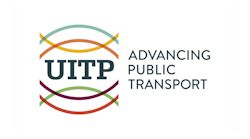UITP Awards Recognize Ambitious and Innovative Mobility Projects
Innovative ideas from across the globe that contribute to advancing public transport were rewarded in the closing ceremony of the UITP Global Public Transport Summit on May 17, 2017 in Montréal.
Every two years, the UITP Awards acknowledge ambitious and innovative sustainable mobility projects contributing to the sector objective of doubling the public transport modal share worldwide by 2025. The 2017 UITP Awards highlight successful projects implemented around the world in the period 2015-2017 that place public transport at the heart of the urban and local mobility system. Successful projects should be ambitious, innovative and transferable to other cities and regions.
Winners were selected by an international panel of experts and announced at the closing ceremony of the UITP Global Public Transport Summit. “I’m very pleased to announce the winners of the UITP Awards 2017. We received more than 230 applications for the Awards and it just goes to demonstrate the commitment of the public transport sector towards the provision of innovative services to meet the ever growing demand for mobility in cities around the world,” said UITP Secretary General Alain Flausch.
Winners of the UITP Awards 2017:
Public transport strategy
Cape Town Transport and Urban Development Authority (South Africa) for the project, ‘Cape Town Transit Oriented Development Strategic Framework’ (TODSF). The TODSF represents a paradigm shift in the city’s approach to integrated land and public transport development and growth management. The approach and methodology could be replicated for use in for many other growing cities around the world. Effective implementation of the TODSF would result in a 20 percent improvement in public transport mode share by 2032 which in turn would result in significantly less carbon dioxide emissions for the transport sector in Cape Town.
Customer experience
City Government of Muntinlupa and the Lingkod Muntinlupa Foundation (Philippines), for the project, ‘Leading the e-Jeepney revolution in the Philippines’ — the e–Jeepney creatively re-defines the customer experience of a flexible public transport service that is a core feature of mobility in the Philippines. It utilizes new technology to enable booking and payment, and an eco-friendly vehicle for service delivery, based on a customer-centred approach to service design. This is an exemplar project for redefining flexible mobility services that is transferable to many developing areas of the world.
Operational and technical excellence
Vasttrafik and Volvo Group (Sweden) for the project, ‘ElectriCity’ — multi-stakeholder electric bus demonstration project implemented in Gothenburg, Sweden on public transport line 55, connecting two university campuses. This project successfully integrates all elements of modern bus-based mobility solutions and points to the future of bus services worldwide. Its innovative technology is deployed in real operation conditions and it is perfectly integrated in the public transport system.
Smart financing and business models
Addax Assesoria Economica e Financeira LTDA, Empresa Metropolitana de Transportes Urbanos de São Paolo S.A. (Brazil) for the project, ‘Public Private Partnership – Baixanda Santista – Bus and LRT integrate system’. Simultaneous award of a whole metropolitan region of public service transport to one single private partner concession company including both LRT and bus modes. Broad financing model, additional revenues possible and planned, integrated transport approach. An example of how to finance the new public transport systems needed to answer to the increasing mobility demand in growing economies.
Small cities and low density areas
Nordjyllands Trafikselskab (NT) – public transport authority of North Denmark for the project ‘Around your world’. This project offers an excellent, complete and integrated mobility solution for residents in low density regional settings, including: hourly services all day, an on demand responsive service and a travel planner. Strategy covering the entire region of North Denmark and all modes of transport (including carpooling, car sharing etc.)
Design
Atkins, Network Rail and MACE (UK) for the, ‘Birmingham Gateway Project’. The ‘Birmingham Gateway Project’ is the £750 million ($976.51 million) landmark transformation of Birmingham New Street Station. The project significantly increased users’ space perception and passenger flows inside the building, with brighter, cleaner platforms and a better access. A contemporary station exterior which reflects the dynamism of this vcity. The project integrates new pedestrian links across the city center, giving direct access and interchange with the planned Metro stop in Stephenson Street.
Y4PT young leadership
Ulrich Strötz, software team lead in Door2Door, Germany, has been chosen as the 2017 UITP Young Leader. Ulrich Strötz is a straightforward example of natural leadership with both strong technical skills and the capacity to easily motivate and challenge his team. Education MSc Geographic Information Science & Cartography 2012–2014 BSc Forest Ecosystem Management 2008–2012.
UITP has also handed over today the following Special Recognitions to two overarching projects that demonstrate outstanding strategic commitment and ambition:
- Société du Grand Paris for the “Grand Paris Express” Project.
The new automated ring metro encircling Paris will answer the expected public transport ridership increase and reinforce the public transport service in areas poorly served today. The project has started implementation and will imply a €28 billion ($31.11 billion) investment by 2030.
- Moscow City Government, Mosgortrans and Moscow Metro for the successful implementation of Moscow’s ambitious an integrated urban transport strategy. In the last five years Moscow has gone through the upgrade of the land transport network, the extension and modernisation of the underground network and the renovation and further completion of the Moscow Central Circle. The creation of a unified parking space, the launching of a cycling infrastructure and the introduction of pedestrian zones are also part of Moscow’s achievements.



